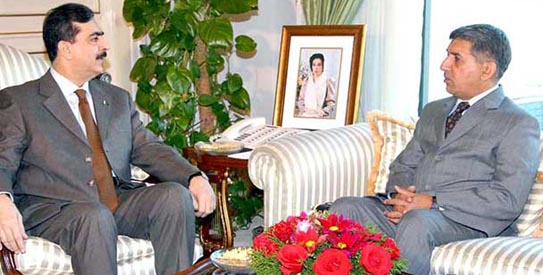ISLAMABAD: Less than a year after Prime Minister Yousuf Raza Gilani announced his unprecedented decision to give General Ashfaq Parvez Kayani a three-year extension, the premier faces another equally tough decision — whether or not to retain the director general of the Inter-Services Intelligence, Lt-General Ahmed Shuja Pasha. Already on a year-long extension given in March last year after reaching retirement age, General Pasha’s second ‘tenure’ comes to an end on March 18. However, sources in the government say that he is likely to get another two years in office as the country faces serious internal and external security challenges. The decision is likely to be announced before March 18.
Despite the fact that it is very rare for a Pakistani army officer to get two extensions, the move will not come as a surprise given the general’s close association with the army chief.
Military sources said one of the reasons for Pasha’s close association with General Kayani was that both shared a moderate nationalist view. “He enjoys the full confidence of the chief and is fully committed to fighting religious extremism and militancy,” said a senior official.
However, the case for his extension may also have been strengthened by his ability to get along with the Americans. Some analysts contend that with its war in Afghanistan entering a critical phase, the United States would also like to deal with an ISI chief familiar to them. The US authorities, sources say, were informed about the impending decision on General Pasha’s extension several months ago.
The increasing tension between the ISI and the CIA over the arrest of Raymond Davis, a CIA contractor, is believed to have reinforced the thinking that an experienced hand is needed to defuse the situation.
“General Pasha’s familiarity with the issue may be important in dealing with the current tension with the United States,” said Lt-General (retd) Talat Masood. “The grave challenges faced by the country require continuity in the ISI leadership.”
Military sources also justify the decision by saying that there is a need for continuity of command in view of ISI’s critical role in combating militancy at home and in dealing with the developing situation in Afghanistan.
However, there is no doubt that along with the PPP government, it is General Ashfaq Parvez Kayani, himself on a three-year extension, who will be caught in the controversy that Pasha’s extension can lead to; the COAS may find it tough to explain the rationale behind this decision. Regardless of the prime minister’s signatures on the extension orders, it goes without saying that the decision will be viewed as Gen Kayani’s.
General Pasha was appointed to the coveted post in September 2008 after serving for many years as Director General Military Operations; in the latter role he supervised the Pakistan army’s counter-insurgency campaign in the troubled northwestern Pakistan and the tribal region. Known as a highly professional soldier, he took over the reins of the ISI at a time when the agency was being accused by Washington and other western allies of playing “double game”.
However, this general with a reputation of being a moderate developed a good rapport with the CIA and other western intelligence despite the strained relations between Islamabad and Washington at that time. “He has a very clear mind,” said a western diplomat who has interacted with him.
His appointment also signalled some major changes within the organisation.
This is not to say however that the extension would find few takers.
“Given the current situation, the decision is understandable, but not completely defensible,” said Lt-General Asad Durrani, a former ISI chief.
Those that do not support the extension fear that such decisions could affect the military’s professionalism. “Institutions are built by adhering to change and bringing in a new generation of leadership,” pointed out General Masood.
The ISI is not just responsible for intelligence gathering, but also acts as a determinant of Pakistan’s foreign policy and a vehicle for its implementation. It had also served as an instrument for promoting the military’s domestic political agenda and had been responsible in the past for making and breaking civilian governments.
This is one reason that for every civilian and military government, controlling the ISI is seen as crucial to maintaining a firm grip on power. However, the all-powerful agency has played by its own rules for some time now.
As a result, its various heads, despite differing styles and personalities, have emerged as powerful figures in the country’s ruling establishments of their times.
Although it comes under the prime minister, the agency falls directly within the Pakistan military’s chain of command. In many ways the ISI is different from intelligence agencies of other countries which are run by civilians. Overwhelming majority of its officers are military personnel who are rotated in and out for a fixed tenure. With one exception, all the ISI chiefs belonged to the army’s hierarchy. The organisation has expanded hugely over the past ten years with its new counter-terrorism role.













































Dear visitor, the comments section is undergoing an overhaul and will return soon.